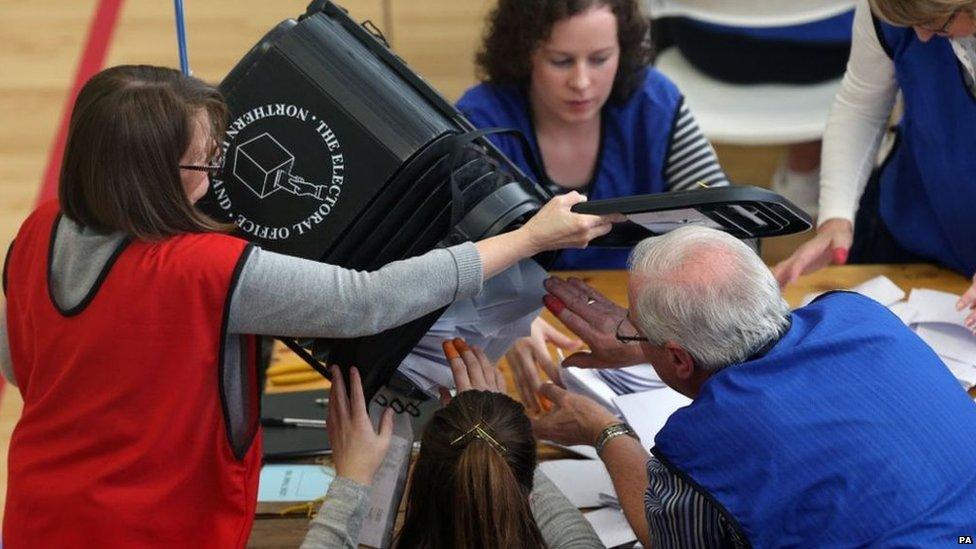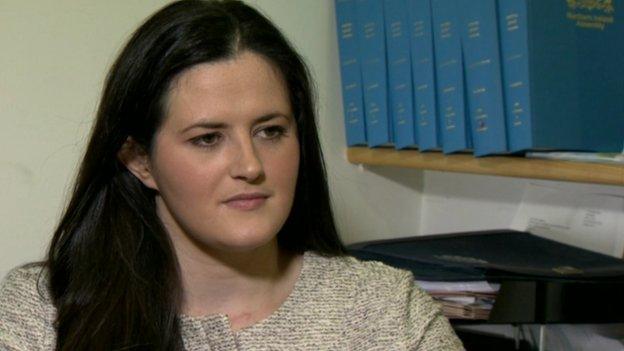Is Stormont stalemate coming to an end?
- Published

2017 - a seemingly unending sequence of talks and elections
It's been more than eight months since the late Martin McGuinness tendered his resignation as deputy first minister.
Since then, Northern Ireland has been stuck in an apparently never-ending sequence of talks and elections, with so many "crucial weeks" and missed deadlines that political anoraks, let alone the general public, could be forgiven for losing interest.
Set beside thousands of Bombardier jobs under threat and the far-reaching consequences of Brexit, the stand-off between the DUP and Sinn Féin over what any legislation dealing with language and culture should be called seems frustrating and repetitive.
Approaching an end?
But could this phase finally be approaching an end?
Next week, the main Stormont party leaders will attend the Conservative conference in Manchester.
The following week, MPs return to the Commons after their break for the conference season.
Some Westminster sources have told me the week after that - the third week in October - could prove pivotal to the Stormont saga.
There haven't been many leaks from the DUP-Sinn Féin talks currently going on inside Parliament Buildings.

Reporters have been reduced to reading the tea leaves
Instead, reporters are forced to try to read the tea leaves, poring over the politicians' public utterances which seem upbeat one day, then down in the dumps the next.
I have a good deal of sympathy with the Green MLA Clare Bailey who pointed out the lack of substance, external to some of our reports about this "mood music", concluding that ultimately nothing appears to have changed
Late last month, the DUP's Sammy Wilson seemed to justify that negative view, declaring the Stormont talks a "sham".
In the middle of this month, the DUP and Sinn Féin were trading terms like "humiliating" and "insulting" about each others' positions.
But in recent days, one senior unionist source seemed more upbeat. The source dismissed the view that Sinn Féin has its eye on Brexit and a border poll, so has lost interest in Stormont.
'Negotiations are serious'
Instead, the source insisted the negotiations are serious and the two main protagonists are honing down their differences.
Speaking in the Great Hall on Wednesday, the Sinn Féin Stormont leader, Michelle O'Neill, gave little away, only telling reporters that she "always likes to remain positive" and that "we need to find a way through the issues and the best way to do that is to restore the institutions on a sustainable basis, on a basis of equality respect and integrity".
The shape of a potential compromise seems far from clear. Alliance is suggesting what might be called a legal "three-piece suite".
One act would cover the Irish Language, a second law the Ulster Scots and minority languages, and a third bill would deal with other cultural matters.
The idea is that none of these laws would be able to proceed through the assembly without the others also making progress.
Would this approach allow the DUP and Sinn Féin enough wriggle room to cover the policy U-turns they may well have to make to restore power sharing?
Or, will they remain stuck in a game - as the former justice minister Claire Sugden put it to me - of "who blinks first?"

Claire Sugden says she would be content to relinquish her former justice role
If the executive is restored, Claire Sugden says she's "quite content" to no longer be justice minister.
After their abortive experiment with opposition, it seems likely the SDLP and the Ulster Unionists will want to return to a future power-sharing government (although the UUP's attitude might be influenced by their opposition to an Irish Language Act).
Alliance could oust Claire Sugden from her justice minister role, although there are different views within the party about whether they are better in opposition or government.
As before, the key will be how far the big parties are prepared to move to meet Alliance concerns about the controversial petition of concern - the veto procedure used in the past to block, among other things, same-sex marriage.
Whatever happens it seems likely James Brokenshire will bring some kind of legislation before parliament in the next few weeks.
A financial appropriation act to put the Stormont departments' budgets on a firmer footing is easy to predict.
But a law to enable the return of the local politicians, or a bill to herald the arrival of a new bunch of direct rule ministers? That one is harder to call.